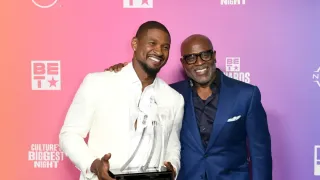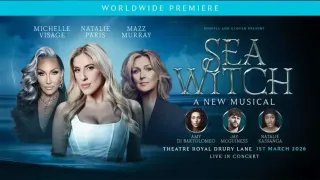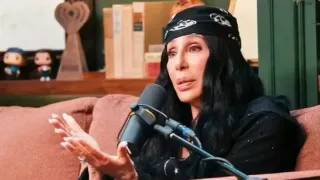November 28, 2015
Denis O'Hare: Ubiquitous, Edgy, Out, and Grateful
Frank J. Avella READ TIME: 11 MIN.
The word ubiquitous suits actor-author-activist Denis O'Hare. Since his balls-out Tony Award-winning performance in Richard Greenberg's play "Take Me Out" in 2003, O'Hare has bounced from stage to screen to television with whiplash regularity. But he's not simply grabbing gigs to cash a paycheck -- the beguiling thespian has been a part of some of the most significant projects in recent years.
His diverse stage work has included the 2004 revival of Stephen Sondheim's musical "Assassins"; the 2005 revival of "Sweet Charity," opposite Christina Applegate; and the 2007 Broadway revival of "Inherit the Wind," with Christopher Plummer and Brian Dennehy. In 2009, he starred with Maggie Gyllenhaal in the Classic Stage Company's production of Chekhov's "Uncle Vanya."
On the large screen, O'Hare has delivered memorable supporting turns in "21 Grams," "A Mighty Heart," "Milk," "Charlie Wilson's War," and "Dallas Buyers Club," to name a few.
His small-screen work includes the Emmy Award-winning HBO film "The Normal Heart," an unforgettable turn as the Vampire King of Mississippi in "True Blood" and, of course, four out of five "American Horror Story" seasons, garnering him two Emmy nominations in the process.
Looking at the potpourri of parts in all three media, there is one definite pattern (besides the obvious Oscar-Tony-Emmy pedigree): O'Hare seems to seek out LGBT-oriented material -- that, or they find their way to him. And he dives right in, since his work appears to be defined by a delicious daring in his choices and his approach.
EDGE recently spoke with O'Hare to discuss the current season of "American Horror Story" and his career as well as his commitment to the fight for LGBTQ rights.
"Oh, I'm just an angry person," he initially quipped of his fearlessness as an actor. "I love acting. I think it's an extraordinary craft. To me it is an art form that demands dedication and respect. There is no slumming, no doing a half-ass job. And this year especially, this character [on 'American Horror Story: Hotel'] is very intense. It's not one I would have chosen...I don't consider myself any more fearless than anybody else."
As far as medium switching, O'Hare doesn't mind one bit. "I feel very lucky as an actor to be at home in more than one medium," he imparts. "To be at home in film and TV as well as on the stage is a gift. I am a theater actor first -- that's where I trained, where I started. In many ways it's where I've been most comfortable, but I also feel very comfortable working in TV and film, and I love what we are afforded the opportunity to do in those mediums. It's a very different way of acting. When you're acting onstage, it's a total body experience. You're acting in 360 [degrees]. And you're your own editor. In film and TV you are a collaborator. You are not the total creator as you are in the theater. It's a different art."
"I think any good actor is going to devote themselves completely to their character," O'Hare adds.
He's certainly managed that on the first, third and fourth seasons of "American Horror Story" -- from the enigmatic burn victim of "Murder House," to the fiercely loyal mute servant in "Coven," to the cutthroat con man in "Freak Show." Each character had shadings and was more than a bit chilling and off-putting.
Checking In with Liz Taylor
This season, "Hotel" is no different. O'Hare plays a very mysterious being known as "Liz Taylor," whose story wraps up in Episode 4, but in Episodes 5 and 6 "we get her backstory and we get her love story."
"She's sort of the psychiatrist for the hotel," O'Hare teases. "She's the ear that everybody comes to. She bartends at the Blue Parrot Lounge, which we will be spending a lot of time in, and you get to actually see her at work: a ready ear, an easy pouring hand..."
The show's schedule is pretty intense for all the actors. O'Hare shares, "Our schedules are always mysterious, so we kind of don't always know when we're working. For a while it felt like I was always first up. I would be getting on the set at 5 to 5:30 a.m., when it's pitch black. That means getting up at quarter to 4. Then I do an hour and 15 minutes of makeup, most of which involves shaving various parts of my body. It depends on what part of my body will be showing. Some days it's about getting my chest cleaned. It's always my head. And I always have to shave my face. Some days it's my arms. It's a crazy world that I really love."
He offers, "Recently I had a sex scene -- yes, a sex scene -- and so to prepare for it, I wanted to be as female as possible. I was doing a sci-fi convention in Salt Lake City, and my last night there I ran out a bought two [containers] of Nair and came back to my hotel room and ordered room service and...I Naired my entire body! That was my Saturday night! I think it's an appropriate thing to do in Salt Lake City. I mean, it would be a better story if I said I hired somebody to do it for me in Salt Lake City, but...that's probably illegal."
Many in the "AHS" family, like O'Hare, keep coming back season after season, including Kathy Bates, Angela Bassett, Evan Peters, Wes Bentley, Sarah Paulson and Matt Bomer.
"We were all talking about how comfortable it is this year," O'Hare comments. "It definitely feels like we've all matured. It's still crazy and frantic and insane, but there's ease about it -- an assurance. Nobody really complains. Everyone shows up in really great spirits, ready to work. And we all really trust and know each other at this point...On any given day, I'll do a scene with Angela or Matt or Wes or Stephanie [Lady Gaga] or Kathy, and it's like meeting an old friend. You show up and you go, 'Oh, yay! I get to work with you today!' We all feel that way. It's kind of a slow-moving party -- with work involved. And the other thing is that we've all been through the ringer, so to speak, of [playing a] different character in a different story on a different location. And somehow being back in L.A., even though I live in Brooklyn, is calming everybody down."
One notable cast change is the departure of Jessica Lange. O'Hare acknowledges feeling her absence and adds, "Everyone brings so much to [the process], and Jessica always brought so much -- she's an incredible performer. She's obviously missed. Because each season is different, the loss is not quite as keen. If we were repeating 'Freak Show' or 'Coven' it would be crazy not to have her -- the loss would feel really, really great. But because we're doing a new story with a new location and new characters, it isn't terribly keen, because she wasn't part of it and then removed from us. That would have been drastic."
The continued success of "AHS" can be greatly attributed to the show's ravenous supporters. O'Hare believes that fans of the horror/sci-fi genre aren't put off by LGBT-related characters or content.
Publicly Out and Sometimes Privately Private
"I do a lot of sci-fi conventions where I'm surrounded by 'Star Wars' people and superheroes people, and it's a very accepting environment. I find the sci-fi genre world -- 'True Blood,' 'Walking Dead' included -- to be a pretty accepting environment. And 'American Horror Story' fits very neatly into that genre world. Maybe because in that world your imagination is being asked to play a part, or because in that world there are already so many different types of creations that there isn't as rigid a sense of what is and isn't acceptable."
The show's creators, Ryan Murphy and Brad Falchuk ("Nip/Tuck," "Glee"), have infused the show with a gay sensibility and pursued stories that explore sexual fluidity. In the process, they have raised LGBT awareness.
"I do think that Ryan and Brad have been at the forefront of putting these issues in people's houses on a weekly basis," O'Hare opines. "When you think of 'Glee' and its characters and the issues that were brought up -- and 'American Horror Story' absolutely has had a diversity of types of characters. This year sexuality is very fluid, and my character, Liz Taylor, is gender fluid. She's not a drag queen. She thinks of herself as a woman. She's somewhere on the transgender spectrum. She knows what she is. I'm not sure what the outside world would label her, but when it comes to labels, who are they for anyway?"
Labels are something that as an actor O'Hare has been able to avoid. Out and proud in an industry that at times can be a "boys club," O'Hare finds more challenges being gay in his everyday life.
"I think as a gay person, you're lying if you say you don't take the easier road at some point during the day," he confesses. "How many times a day do we have to come out? I had a meeting today. An engineer came to my house to check my building for an insurance issue and he said, 'Oh my God, your apartment is so beautiful.' And the reply should be, 'Well, thanks, my husband did it.' My husband [Hugo Redwood] is an interior designer, and he did it. But, at that point, in front of the burly engineer, I'm faced with the option to tell the truth or not tell the truth. So I did. And guess what? It made it uncomfortable for him and for me. Sometimes, as gay people, we don't want to do that."
O'Hare elaborates further: "I tend to be fairly honest about my sexuality, but I'd be lying if I said that I haven't omitted information, that I haven't taken the easier, softer way. When it comes to big moments, I'm an activist, so I'm always fierce about being out. But sometimes in my daily life I let people assume I'm straight because I can pass as straight. It's a very corrosive thing that you can allow yourself to pass for straight. It's actually very damaging to us. But believe me, it was a lot worse back then."
Taking A Stand and Keeping Busy
Denis Patrick Seamus O'Hare was born in Kansas City, MO, in 1962 but grew up in the Detroit suburbs. "I was dealing with being gay as early as 1974," he reveals. "I had my first experience when I was 12. And when I tried to come out to my psychology teacher in high school in 1978, he told me to shut my mouth and that I was sick. It was 1978. We had no real role models. Our role models were [the characters in] the play 'The Boys in the Band,' which sends an awful message to a young gay person. Or Paul Lynde. [He laughs ironically] Where do you look to see what your life can be like?"
He comments on the LGBT advancement in these last few decades: "I think we're at a very good place, and the progress is extraordinary. I'm legally married. We've come a really long way. My 83-year-old Irish Republican father calls me up and says, 'Give my love to Hugo, and give my love to your son,' without batting an eye. It has taken time. None of it has happened overnight, but we're in a really, really good place right now."
Despite the forward motion, O'Hare is adamant about what the new battle is. "We need to make sure that we don't let politicians or the media muffle or muddle the issues. This idea of religious freedom is a very distracting issue. And what we're trying to do is balance religious freedom with civil rights. Well, my civil rights are never up for negotiation. They can call it whatever they want to call it -- it's still discrimination. That's the biggest struggle we have right now, is to figure out how we as a country balance these two very basic issues: religious freedom and civil rights. And it's not that difficult."
When he isn't acting, or being a husband and father, or speaking out on gay rights, O'Hare has another creative vocation: playwriting. "My friend, Lisa Peterson, and I write together. We wrote a play called 'An Iliad' that we were able to do in a bunch of places. We did it in Cairo last year. We've done it in Australia and across the U.S. We also wrote a play about the Bible called 'The Good Book' that we're trying to get a second production of. And we've been commissioned to write a play about the Fall of Rome for Princeton and the McCarter."
Sounds like a full life, but O'Hare isn't having it. "I feel like I'm not busy enough," he says. "I feel like I'm lazy at times. I guess I have a pretty strong work ethic. And I have a lot want to do. I figured out that I have to live until at least 95 to do all the things I want to do. I have a lot of things on my plate that I'm desperate to make sure I get done."
O'Hare is filled with gratitude: "I love what I get to do. I love working. I love being able to work. And if I'm not working, I'm a little bit at a loss. And I usually end up finding something else to create."






